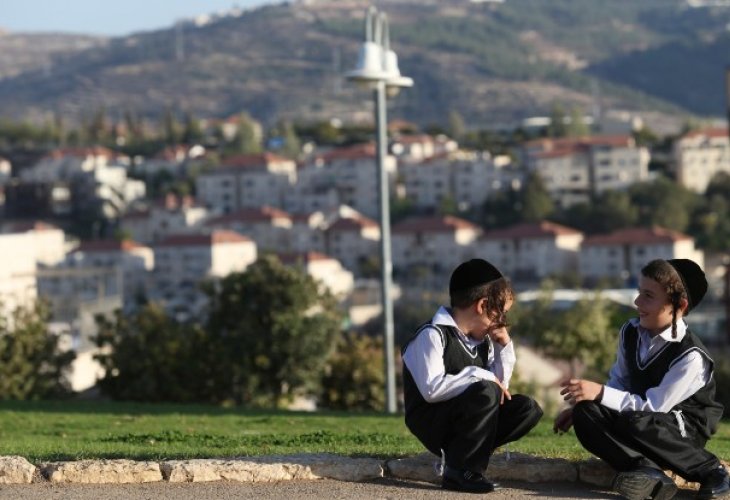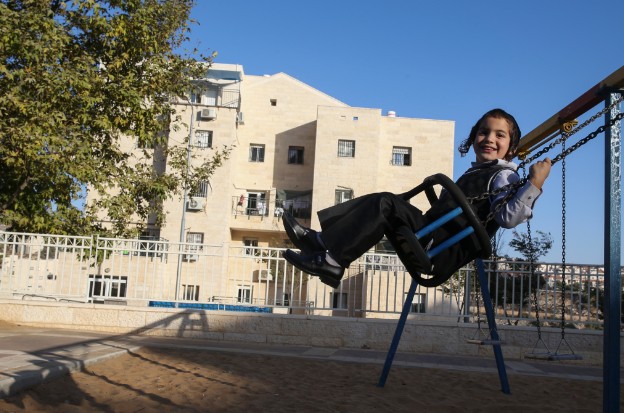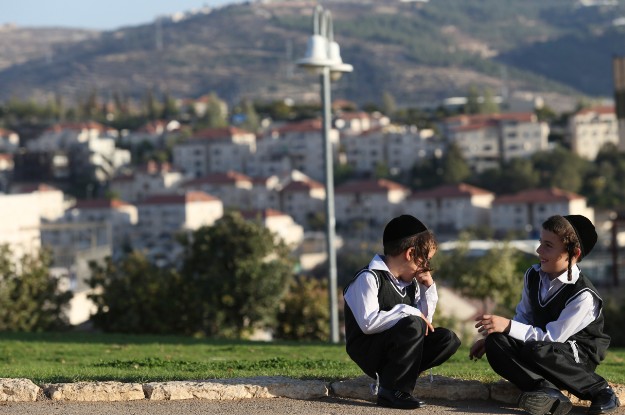Beginners Guide
We've Started Observing Mitzvot - Where Is the Best Place to Live?
Dan Tiomkin presents the advantages and disadvantages of moving to a Haredi community and provides important tips before making a decision.

Hello Dan, my wife and I began drawing closer to Judaism three years ago. At first, we were very excited and focused on the process, not paying attention to what was happening around us. But over time, everything in our neighborhood started to bother us — the immodest talks in the street, the distance from useful stores (like kosher supermarkets, modest clothing stores, religious bookstores, etc.), and most challenging of all — the desecration of Shabbat. After spending a few Shabbats with friends in Shabbat-observant areas, we could barely return to the secular city where we live... We are considering moving to a Haredi city, but we've heard that it may not always be recommended. Is it true? What do you suggest we do?
Thank you, Moshe.
* * *
Hello Moshe,
It's challenging to answer this question, but one thing is clear: there is no perfect place. Every location has pros and cons. A different place suits each person, and there are various considerations (such as proximity to parents, workplace, etc.) that are personal and ultimately determine the ideal place of residence. However, there are some pitfalls to be aware of in advance.
Why Leave the Settlement?
Many who become observant and grew up in peripheral or secular cities have an understandable tendency to disdain the places they grew up in due to their perceived low spiritual level. They heavily weigh the disadvantages of these places while being dazzled and excited by community settlements with modesty and religious convenience (abundance of educational institutions, nearby kosher grocery stores, a mikvah, etc.). However, despite these advantages, there is justification in what you were told — that moving to distinctly Haredi cities and concentrations may not always be recommended for the newly observant.
I heard about a family (let's call them the Shimoni family) who lived in a settlement. In that settlement, several families began to return to faith, and the Shimoni family was truly the core of the religious community in the settlement. They organized a weekly home gathering with visiting rabbis, succeeded in establishing a regular minyan at the small synagogue, organized transportation to religious schools in the nearby city, and worked on setting up a mikvah in the settlement, among other activities.
 Illustration (Photo by Nati Shohat / Flash 90)
Illustration (Photo by Nati Shohat / Flash 90)The religious community in the settlement thrived until that family decided to move to Kiryat Sefer (a distinctly Haredi neighborhood). They were enthusiastic about the level of modesty, the abundance of yeshivas, the myriad charitable organizations, and began searching for an apartment in Kiryat Sefer to educate their children in a Torah city rather than in a simple agricultural settlement.
The religious community in the settlement was very saddened by the news. They didn't know how they would continue the religious activities, the classes, etc., but the Shimoni family was determined to progress spiritually. One day a moving truck came, and the connection between the Shimoni family and the settlement ended.
Ten years later, there was a wedding for the Shimoni family's closest friends from the settlement and the Shimoni family traveled to attend the wedding. The shock was immense for both sides upon reuniting, after seeing and hearing what happened to each other. The community of returning observants in the settlement continued to flourish and grow even without the Shimoni family. The children, although they traveled daily to religious schools, yeshivas, and seminaries, would return home for Shabbat and holidays, growing into exemplary individuals.
In contrast, the Shimoni family completely changed. In Kiryat Sefer, they were no longer the driving force behind religious or community activities. On the contrary, they encountered municipal acceptance committees and school admission committees, where they constantly needed to prove themselves. The change in status didn’t disturb them as much as it affected their children, who went from being the diligent kids to feeling like second class. Any slight behavioral lapse would immediately lead to an angry meeting with the principal, hinting that maybe the child was not suited to the school and that they should consider a different framework. As the children grew up, two of them began straying from the path, and therefore, at the wedding, they were so shocked to see how families in the settlement managed to grow and flourish splendidly, experiencing pride in their children.
Social Homogeneity
This isn't a fictional story. I've heard a similar story from numerous observant returnees, all of whom share the same pattern. Some attribute the failure to leaving the guidance and support of the rabbi in the previous settlement; many claim that the transition to the Haredi settlement developed unrealistic aspirations and unsuccessful attempts to be seen as a "standard Haredi," despite vastly different starting points. Others blame the Haredi settlements themselves for zealously preserving their character and not easily accepting those who are different. But it's clear that just like it's not easy to hold leftist views in settlements, a community-based society struggles to accept different opinions. Observant returnees, by definition, have differences (parents who visit in different attire, differing courtesy customs, etc.). Despite their understandable efforts to blend and assimilate, there will always be nuances they don't notice, which will always leave them feeling different and remote in the eyes of society. Despite the non-obligatory politeness in daily interactions, there will be times when they, too, will feel this, and likewise, their children will feel inferior in society because they keenly notice their classmates' hidden glances that they are different.
If there's no alternative, and one decides, for whatever reason, to move to a Haredi community place, it's advised to heed the advice of Rabbi Moshe Shapira Shlita, who said that if observant returnees choose to move to a Haredi community, the best place to live is the neighborhood's edge. This way you can be close to the mikvah, the grocery, and the educational institutions, without being subjected to pressures (usually subtle) to conform to accepted positions. This way, the returnee can maintain their personality and uniqueness while benefiting from the comfort of living in a religious area.
Who's Setting the Tone?
The starting point, as mentioned, should be acknowledged; there's no perfect place on earth. Every place has all types of people: the gossipmonger, the annoying neighbor, the grumbler, the bother in the stairwell, and on the other hand: the righteous, the scholar, the one adds good energy. All types are everywhere. The question is the proportion of each type or which type sets the tone and atmosphere.
Some places are characterized by friendliness and a welcoming demeanor while in other places seriousness, suspicion, and restraint are more prevalent. Some places are more accepting of others, while some categorize everyone and pressure them to conform. Today, in the exile of baseless hatred, unfortunately, the reality is that differences between various groups (ethnicities, social classes, etc.) are more pronounced in Haredi community places, and there is increasing resistance to accepting differences. In contrast, in peripheral areas, usually, all who fear Hashem unite; there is more acceptance of the other and more peace and harmony. Places with many elders, many householders with fear of Heaven who dedicate time to Torah and honor Torah scholars generally have a more relaxed and accepting atmosphere, with less competition.
I know a returnee who lived in Elad, paying extremely high rent (with no chance of buying a house there). His wife, an expert in her field, couldn't find a job, and their child wasn't accepted into the religious school they wanted. I suggested they explore moving to a peripheral area: cities like Rehovot, Haifa, or Hadera, where prices are lower, there are more employment opportunities, and the community is more united, pleasant, and accepting. They did check, and a few months later, they moved to Haifa after the wife found a great job (Haifa is an industrial port city rich in job opportunities). They rented a lovely apartment (in the Hadar neighborhood) overlooking Haifa Bay, not far from "Little Geula" for almost half the price they paid in the center. They were very satisfied with the educational institutions and clearly, the change was good for them. A year later, they even managed to buy an apartment there with a reasonable mortgage.
 Illustration (Photo by Nati Shohat / Flash 90)
Illustration (Photo by Nati Shohat / Flash 90)My intention is not to recommend or criticize any specific place. In various distinctly Haredi communities, there are numerous disadvantages for returning observants, but on the other hand, more mixed places have their disadvantages. Certain factors are advantageous for one person while a disadvantage for another. It's very difficult to try and establish rules for this, and any attempt would necessarily be too superficial, and therefore each individual should personally investigate and examine their surroundings.
One returnee told me it's a tremendous virtue to live near his in-laws (or his parents), for the help and the sanctification of Hashem that it involves, while another returnee told me that being distant from family and seeing them only every couple of weeks allowed them independence to properly build their lives.
Who is right? It's a personal question that varies from person to person. Another example: a Jew living in Tifrach thinks that having his children isolated in a bubble away from the world, not knowing what TV or a computer is, is the greatest gift imaginable. Another Jew, living in the Ramot neighborhood in Jerusalem, told me that the diversity in the neighborhood of secular, national-religious, and Haredi people exposes his son, in a controlled and measured way, to all facets of the Jewish people. Like a vaccine — now his son won't be confused by the world's temptations in his maturity, making it the greatest gift imaginable.
Even here, one cannot definitively determine who is right. One thing is certain: as long as you and your spouse feel comfortable in your residence, and the children manage well in educational institutions, there seems to be no need for unnecessary upheaval in moving residence; however, if the situation becomes unbearable and you feel you must make a move, consider moving to a place best suited for you in every possible way.
I want to note that the decision to move residence must be made equally by both partners. If one partner objects to the move and feels unordered or unwilling, the other should patiently wait, respect their partner's wishes, and try to persuade them gently and kindly. If the partner agrees, that's great; if not, there's no point in applying pressure. Doing so will only cause resistance, and even if the partner eventually agrees to the move just to please the other side, they will do so resentfully, potentially causing future issues in marital harmony, which are far more crucial and severe than the discomfort of residing in a non-religious area.
* * *
We'll conclude with the words of the commentators ("Conversations on the Book of Genesis" by Rabbi Nevenzal Shlita, Parashat Lech Lecha), stating that change brings a person to a new state. The home, city, and place to which a person has become accustomed change, and with it comes the opportunity for further life changes. Every person is influenced by the environment and society in which he lives, and to change habits and start anew, a change of place is needed, so much so that even Abraham our Patriarch, who sanctified the name of Heaven in Haran and withstood the trial of the fiery furnace, needed to change location to merit children- he needed to leave Haran and move to the Land of Israel.
Some argue that those who return to observance require separate communities, while others claim there's nothing like a big city. As mentioned, the decision is very personal and depends on many variables that differ from person to person.
May we all find the most suitable place for us, where we can develop and thrive in our lives in every way possible.
Wishing everyone a happy Festival of Freedom.
To purchase Rabbi Dan Tiomkin's books "Where Penitent Stand", click here.
 עברית
עברית

